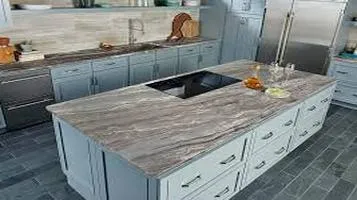The Timeless Elegance and Practicality of Marble Countertops
Marble countertops are a luxurious and timeless addition to any kitchen or bathroom, renowned for their natural beauty and elegance. Characterized by their unique veining patterns and a wide array of colors, from pristine whites to deep greens and blacks, marble countertops add a touch of sophistication to any space. Formed from metamorphic rock, they are heat-resistant and can withstand higher temperatures, making them ideal for baking and cooking enthusiasts. However, marble is a softer stone compared to granite, making it more susceptible to scratches, etching, and staining if not properly sealed and maintained. Regular care, including sealing and gentle cleaning, can help preserve its stunning appearance, ensuring that marble countertops remain a centerpiece of luxury and style in the home.

When it comes to enhancing the aesthetic appeal and functionality of a kitchen or bathroom, few materials can rival the timeless elegance of marble countertops. Known for their distinctive veining and luxurious appearance, marble countertops have long been a favorite among homeowners, interior designers, and architects. However, like any material, they come with their own set of pros and cons. This review delves into the various aspects of marble countertops, offering a comprehensive overview to help you make an informed decision.
Aesthetic Appeal
One of the most compelling reasons to choose marble countertops is their unparalleled beauty. Marble is a natural stone, and each slab is unique, featuring intricate patterns and a wide range of colors from classic white and grey to more exotic shades like green, pink, and black. The veining in marble adds a level of sophistication and can complement a variety of interior design styles, from traditional to modern.
The natural luster of marble countertops also contributes to their luxurious appearance. When polished, marble reflects light beautifully, giving your kitchen or bathroom a bright and airy feel. This quality is particularly beneficial in smaller spaces, as it can make the room appear larger and more open.
Durability and Longevity
Marble is a metamorphic rock composed primarily of calcium carbonate, making it relatively hard and durable. With proper care and maintenance, marble countertops can last for decades, making them a long-term investment. However, it's worth noting that marble is softer than granite and some other natural stones, making it more susceptible to scratches and nicks.
Marble is also heat-resistant, which is a significant advantage in kitchens where hot pots and pans are frequently used. However, it's essential to use trivets or heat pads to prevent potential damage, as sudden changes in temperature can cause the stone to crack.
Maintenance and Care
One of the most frequently cited drawbacks of marble countertops is their susceptibility to staining and etching. Because marble is a porous stone, it can absorb liquids and oils, leading to stains if not promptly cleaned. Acidic substances like lemon juice, wine, and vinegar can cause etching, which is a form of corrosion that leaves dull spots on the surface.
To mitigate these issues, marble countertops should be sealed regularly. Sealants can help protect the stone from stains and make it easier to clean. Wiping up spills immediately and using coasters and cutting boards can also go a long way in preserving the stone's appearance.
Cleaning marble countertops is relatively straightforward. A mild, pH-neutral cleaner or simply warm water and a soft cloth are usually sufficient for daily cleaning. Abrasive cleaners and scrubbing pads should be avoided, as they can scratch the surface.
Cost Considerations
Marble countertops are generally more expensive than other materials like laminate, ceramic tile, and some types of granite. The cost can vary widely depending on the type of marble, thickness of the slab, and the complexity of the installation. While the initial investment may be high, the long-term benefits in terms of durability and aesthetic appeal can justify the expense for many homeowners.
Environmental Impact
For those concerned about the environmental impact, it's worth noting that marble is a natural, biodegradable material. However, the quarrying and transportation of marble can have significant environmental consequences, including habitat destruction and carbon emissions. Choosing locally sourced marble or products with certifications for sustainable practices can help mitigate some of these impacts.
Resale Value
Investing in marble countertops can also positively impact the resale value of your home. Prospective buyers often view marble as a high-end material, and its presence can make your home more attractive on the market. The timeless appeal of marble means it won't easily go out of style, further enhancing its value over time.
Conclusion
Marble countertops offer a blend of beauty, durability, and luxury that few other materials can match. Their unique veining and natural luster make them a standout choice for any kitchen or bathroom. However, they do require a level of care and maintenance that may not be suitable for every homeowner. Regular sealing and prompt cleaning are essential to keep marble looking its best.
While the initial cost can be high, the long-term benefits and potential to increase your home's resale value make marble countertops a worthwhile investment. If you're willing to put in the effort to maintain them, marble countertops can provide a stunning and functional addition to your home for years to come.
In summary, marble countertops are a classic choice that combines timeless beauty with practical benefits. Whether you're renovating your kitchen, updating your bathroom, or designing a new home, marble countertops are worth considering for their unique charm and enduring appeal.
---






